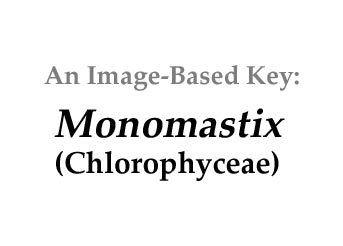|
Home / Chlorophyceae / Unicells / Flagellated / Monomastix |
||||
|
|
||||
|
Click on images for larger format |
||||
Name derivation: |
||||
|
Green angular cell or green productive cell Green Chloro- elongate or productive -gonium
|
||||
Classification: |
||||
Monomastix Scherffel 1912;
all 5 species descriptions are currently accepted taxonomically (Guiry and Guiry 2013..
Order Mamiellales; Family Monomastigaceae
Alternatively: Order Polyblepharidales; Family Pedinomonadaceae
|
||||
Morphology: |
||||
|
Green asymmetric unicell with one emergent flagellum from an anterior depression. Submicroscopic scales unlike any other chlorophycean cover the cell membrane. Single chloroplast, bilobed but essentially cup-shape, each lobe containing a pyrenoid. Posterior stima when present. Up to 7 trichocysts (ejectosomes) present in posterior end. Unequivocal molecular evidence links the green algal ancestor of the euglenoid chloroplasts to the Pyramimonadales, phylogenetic analyses of concatenated chloroplast genes and proteins elucidated the position of Monomastix and showed that the Mamiellales, a clade comprising Ostreococcus and Monomastix, are sister to the Pyramimonadales +Euglena clade (Turmel et al. 2008). |
||||
Similar genera: |
||||
Habitat: |
||||
|
Freshwater |
||||
References: |
||||
|
Guiry, M.D. and
G.M. Guiry 2013. AlgaeBase.
World-wide electronic publication, National University of Ireland, Galway. http://www.algaebase.org;
searched on 16 April 2013. Scherffel, A. 1912.
Zwei neue, trichocystenartige Bildungen führende Flagellaten. Archiv für
Protistenkunde 27: 94-128. Turmel, M., M-C Gagnon, C.J.
O’Kelly, C. Otis and C. Lemieux 2008. The chloroplast genomes of the green algae Pyramimimonas, Monomastix, and
Pycnococcus
shed new light on the evolutionary history of Prasinophytes
and the origin of the secondary chloroplasts of Euglenids. Molecular Biology and Evolution
26(3):631-648.
|
||||

